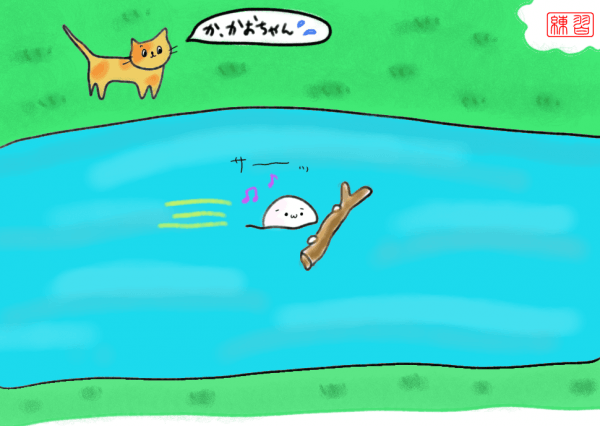Over A; across A; along A
- Over A; across A; along A
- A is the direct object of a transitive verb
- Marks place of departure A
- Shows state A
- Shows the cause A of the subject's emotions B is a verb that shows emotion such as 悲しむ/かなしむ、喜ぶ/よろこぶ, etc.

今日は泳いで川を渡った。
Today I swam across the river.
27
ゴキブリが私のお腹の上を横切った。
A cockroach ran across my stomach.
0
26
小川を歩いて渡った。
I crossed the small stream by foot.
0
86
階段を下りた。
I went down the stairs.
0
26
日本海を船で渡った。
I crossed the Japan Sea by boat.
0
8
右の道を行って下さい。
Take the road on the right.
0
16
誰かが階段を登って来る。
There's somebody coming up the stairs.
0
15
僕は駅の階段を降りた。
I went down the station stairs.
0
Getting the sentences
Construction
(Elements in parentheses are optional.)
Basic Examples:
橋を渡る (cross over a bridge)
Notes
Shows the action passing A
Where this grammar is found
Grammar usage notes
Nothing posted yet!
Questions/Discussion
Nothing posted yet!
A is the direct object of a transitive verb
- Over A; across A; along A
- A is the direct object of a transitive verb
- Marks place of departure A
- Shows state A
- Shows the cause A of the subject's emotions B is a verb that shows emotion such as 悲しむ/かなしむ、喜ぶ/よろこぶ, etc.
32
ミルクを飲みなさい!
Drink the milk!
0
26
蚯蚓を食べた。
I ate an earthworm.
0
15
母の誕生日だったので、ケーキを焼きました。
I baked a cake because it was my mother's birthday.
0
11
よかったら、此のCDを聞いて下さいね。
If you'd like, please listen to this CD.
0
20
納豆を食べてみた。
I tried to eat natto.
0
15
病気の時は、此の薬を飲んで下さい。
Please take this medicine when you are sick.
0
7
ジョンは本棚を作った。
John built a bookcase.
0
7
君と同じシャツを買った。
I bought the same shirt as you.
0
1
私はライオンを見て驚いた。
I was surprised to see a lion.
0
2
彼女はドアを引いて開けた。
She pulled the door open.
0
9
母は弟に黄色い傘を買った。
Mother bought my brother a yellow umbrella.
0
Getting the sentences
Construction
(Elements in parentheses are optional.)
Basic Examples:
御金を払う (pay money)
Where this grammar is found
Grammar usage notes
it is also common to see を at the end of a sentence in this usage, to grab attention, or as set phrase (usually to express wishes)
refer to the "を at the End of a Sentence" section, at
[www.tofugu.com]
refer to the "を at the End of a Sentence" section, at
[www.tofugu.com]
Questions/Discussion
Nothing posted yet!
Marks place of departure A
- Over A; across A; along A
- A is the direct object of a transitive verb
- Marks place of departure A
- Shows state A
- Shows the cause A of the subject's emotions B is a verb that shows emotion such as 悲しむ/かなしむ、喜ぶ/よろこぶ, etc.
4
彼らは今日東京を発つ。
They will depart (from) Tokyo today.
0
Getting the sentences
Construction
(Elements in parentheses are optional.)
Where this grammar is found
Grammar usage notes
Nothing posted yet!
Questions/Discussion
Nothing posted yet!
Shows state A
- Over A; across A; along A
- A is the direct object of a transitive verb
- Marks place of departure A
- Shows state A
- Shows the cause A of the subject's emotions B is a verb that shows emotion such as 悲しむ/かなしむ、喜ぶ/よろこぶ, etc.
2
彼女は東京でシステムエンジニアを為て居る。
She is a systems engineer in Tokyo.
0
10
現在の住まいは長方形の形を為て居る。
My current residence is shaped like a rectangle.
0
Getting the sentences
Construction
(Elements in parentheses are optional.)
Basic Examples:
丸の形を為て居る (shaped like a circle)
撮影監督を為て居る ((someone is) working as a director of photography)
結婚して居る ((someone is) married)
Where this grammar is found
Grammar usage notes
Nothing posted yet!
Questions/Discussion
Nothing posted yet!
Shows the cause A of the subject's emotions
B is a verb that shows emotion such as 悲しむ/かなしむ、喜ぶ/よろこぶ, etc.
- Over A; across A; along A
- A is the direct object of a transitive verb
- Marks place of departure A
- Shows state A
- Shows the cause A of the subject's emotions B is a verb that shows emotion such as 悲しむ/かなしむ、喜ぶ/よろこぶ, etc.
3
私達は彼の死を悲しんだ。
We mourned his death.
0
5
両親は娘の誕生を喜んだ。
The parents were delighted over the birth of their daughter.
0
Getting the sentences
Construction
(Elements in parentheses are optional.)
Basic Examples:
被害を悲しむ (be saddened by the damage)
Where this grammar is found
Grammar usage notes
Nothing posted yet!
Questions/Discussion
Nothing posted yet!